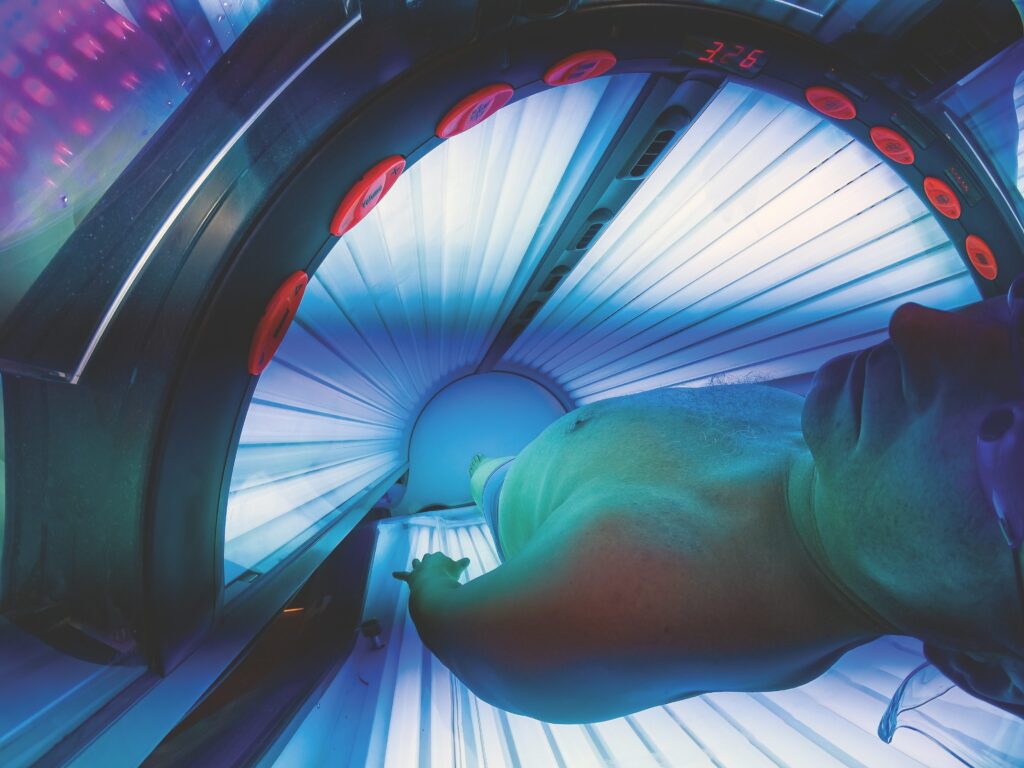Adventure_Photo/Getty Images
Ban the Tan: The Skin Cancer Foundation has long advocated for the FDA to ban cancer-causing indoor tanning, especially for minors.
Q: It’s a well-established fact that using tanning beds (especially at a young age) greatly increases the risk of developing skin cancers, including melanoma. So why are UV tanning salons still allowed to remain open?
Blair Murphy-Rose, MD: It’s terrible, right? There’s overwhelming evidence that tanning beds are a carcinogen, which means we know they cause cancer. The FDA bans other carcinogens, but somehow tanning is still allowed. Let’s look at some of that evidence: In the United States, almost half a million cases of skin cancer a year are linked to indoor tanning.
Research shows that 97 percent of women who are diagnosed with melanoma before the age of 30 had a history of tanning bed use. And there’s a 75 percent increase in risk of developing melanoma if you’ve used a tanning bed before the age of 35. Even one session is dangerous. A 2021 review of 54 studies, in fact, confirmed that indoor tanning is associated with increased risk of early-onset melanoma and nonmelanoma skin cancers, especially in those who used indoor tanning from a young age.
So why is it still legal? In part, it’s because the tanning bed industry has proponents that help protect it, and they spread harmful misinformation. One myth is that tanning beds help your body produce vitamin D. But most beds use bulbs that only emit ultraviolet A (UVA) rays, which don’t affect vitamin D levels. If you’re lacking vitamin D, you can get the recommended 600 to 800 international units (IU) from vitamin D3 fortified foods such as juices and milk or a supplement to close the gap.
Another misconception is that because tanning beds emit mostly UVA rays, they’re safer than going out in the sun, but that’s not true at all. UVA rays are absolutely linked to skin cancer and penetrate skin deeper than UVB. Plus, the bulbs used in the beds are developed to induce a change in the color of your skin quickly; you’re getting tan fast because there’s more damage at the DNA level.
Back in 2015, the FDA tried to ban tanning bed use in people under the age of 18 in the U.S. and require adults to sign a document acknowledging the dangers of tanning, Sadly, this proposed rule still has not been put in place. It’s currently left to state and local governments to restrict or ban indoor tanning. California was the first state to ban indoor tanning for minors in 2012. Since then, 43 more states have either banned or at least restricted tanning bed use in minors.
The under-18 age group is particularly important because this is the time when maybe you don’t know about the dangers; or maybe you’re in denial of the dangers. And we know there is a huge link between UV exposure when you’re young and developing melanoma and other skin cancers. The more exposure you’ve had at a young age, the more years you have for that UV damage to cause DNA changes that could develop into a life-threatening skin cancer down the road.
There is a tanning tax that is believed to help curb some of the use in minors, but that’s certainly not enough. And, really, indoor tanning should be banned for all ages. It’s just hard to pass legislation like this. There have been a lot of petitions calling for a ban, including The Skin Cancer Foundation’s recent joint effort with Refinery29 urging the FDA to finalize the 2015 proposed rule. [Editor’s note: In early 2024, the FDA moved the proposed rule that would ban minors from tanning into the final rulemaking stage. The Skin Cancer Foundation is watching for further developments.] These changes are long overdue. Hopefully, one day soon, indoor tanning will be a thing of the past. — Interview by Amy Brightfield

ABOUT THE EXPERT:
Blair Murphy-Rose, MD, is a board-certified dermatologist in New York City. She has been published in peer-reviewed journals including the Journal of the American Academy of Dermatology, Dermatologic Surgery and Pediatric Dermatology.




